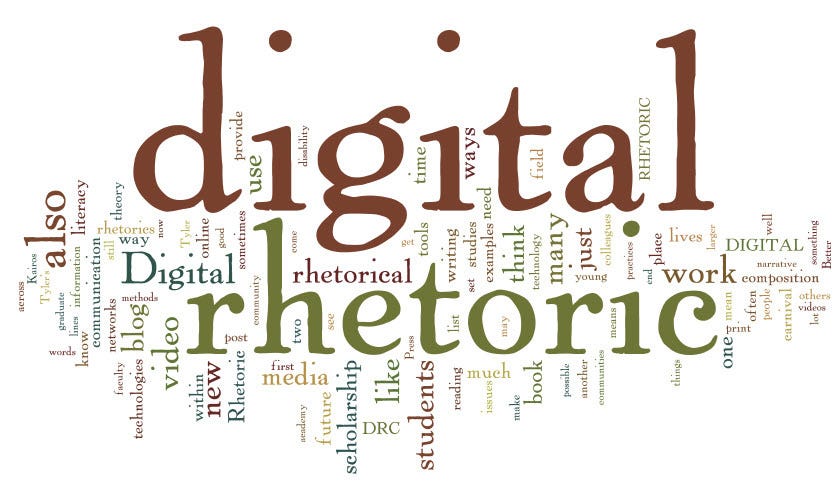𝙴𝙽𝙶 𝟻𝟷𝟻𝟸 | 𝚁𝚎𝚜𝚙𝚘𝚗𝚜𝚎 𝙿𝚘𝚜𝚝 #𝟷: 𝙿𝚎𝚍𝚊𝚐𝚘𝚐𝚢 𝚘𝚏 𝙼𝚞𝚕𝚝𝚒𝚕𝚒𝚝𝚎𝚛𝚊𝚌𝚒𝚎𝚜
The essay "Pedagogy of Multiliteracies" was written by the New London Group, a group of ten academic scholars who met in New Hampshire to develop and bring awareness to certain existing literacy pedagogy that did not meet the expectations of students. In this work of research, the core argument is that current literacy education is perceived as insufficient and lacking when it comes to preparing students in terms of full, active engagement and interaction in their academic and personal lives. Additionally, the argument extends further along as the curriculum for literacy should be structured by educating students through the concept of design. There are four parts of multi-literacy pedagogy: critical framing, overt instruction, situated practice, and transformed practice.
There are two key points which I found to be particularly interesting. The first key point is the discussion of digital fluency. Digital fluency involves effectively preparing students to be successful in the 21st century, which goes beyond just technological use and digital tools. Instead, students must be adaptable to various styles of learning content, educational platforms, develop analytical skills that are important in the workplace, and become highly involved in peer interaction. The second key point is the difference between fluency vs. literacy. When it comes to these components, the concept of language comes to mind. While speech isn't necessarily being discussed here, the point is that to be digitally fluent is similar to learning a new language. By doing so, students who are digitally fluent acquire the ability to share general ideas and successfully apply their knowledge of certain content in many areas through the use of technology and digital tools.
My question for this reading is: How can web/online literacy enhance the application of pedagogical strategies to strengthen and stimulate the learning environment? I figured that I would bring this question into discussion because in this modern age of technology use and the recent surge of virtual learning platforms, the learning and pedagogical styles of curricula are different than in-person, classroom interaction among students and the instructor.

Hi Christina!
ReplyDeleteI thought your focus on digital fluency (and fluency versus literacy in general) was interesting. I'm not sure if I fully grasp it yet, but my current understanding is that literacy involves the skills needed to navigate digital spaces and tools whereas fluency refers more to the ability to utilize these tools with knowledge and proficiency in order to achieve goals or complete tasks. I wasn't entirely sure of this when I read the article, and though I feel like your explanation shed some light on it, I'm still not entirely sure if I'm taking this in the right direction. :)
That said, with regards to your question, I'm trying to figure it out, too! I'm teaching FYC right now, and I'm working on utilizing digital media and tools in new and interesting ways to encourage students to explore new ideas of literacy and rhetoric. Most recently, we had a lesson on multimodality, in which we explored just some of the ways that different modes of design/communication work together. Now, I'm having them practice using multimodality in strategic ways to achieve their rhetorical goals. The use of digital media definitely expands some of the avenues of multimodality--while, in turn, limiting other modes, such as gestural or spacial communication. It's a very interesting double-edged sword.
--Katie Simmons
Much as Katie said, I really enjoyed your detail on just what all is involved in "digital fluency", e.g. in the "PostFord" world. While it's actually just pursuing all that fluency was *always* supposed to amount to, in the context of a world full of technology, success or failure based on self-efficacy via digital platforms, start-up ventures, and the like, now more than ever it seems a frighteningly large task.
ReplyDeleteI might go a little further, though -- nit-picky, I realize -- and offer that digital fluency is like learning how to be a member of a culture. Not only does it require its own code but also carries its own gestures, schema, and expectations. And I guess that's why your final questions seem so important to me: with so much of how we interact suddenly open to change, it's hard to imagine exactly what impact it'll have on the future more subtle areas of "fluency".
As others have already noted, Christina, I think that working through a set of distinctions between "fluency" and "literacy" could be really useful! It may also be important to consider what's gained and lost in using the metaphors of fluency and literacy to describe how we interact with digital technologies. (Spoiler alert: we're going to be talking more about literacy in Week 3, and even more in Week 4, so thread these ideas along!)
ReplyDeleteI do want to note, too, that the NLG only uses the terms "digital" and "computer" once, if my PDF search is working correctly, and that's together. While it's hard to imagine the "pedagogy of multiliteracies" being necessary or relevant outside of the context of globalized digital communications technologies, it's important to remember that this essay was published before many schools had computer labs (and even longer before most homes in the US had desktop computers). So while our discussion of multiliteracies does necessarily need to take into account questions like how web literacies can best be leveraged for education, we are necessarily reaching beyond what the NLG has to say.
However, I think that the "what" and "how" of multiliteracies may offer us some guidance here: what might their cycle of design and pedagogical movement through situated practice, overt instruction, critical framing, and transformed practice suggest for how to use digital technologies to support contemporary learning environments?